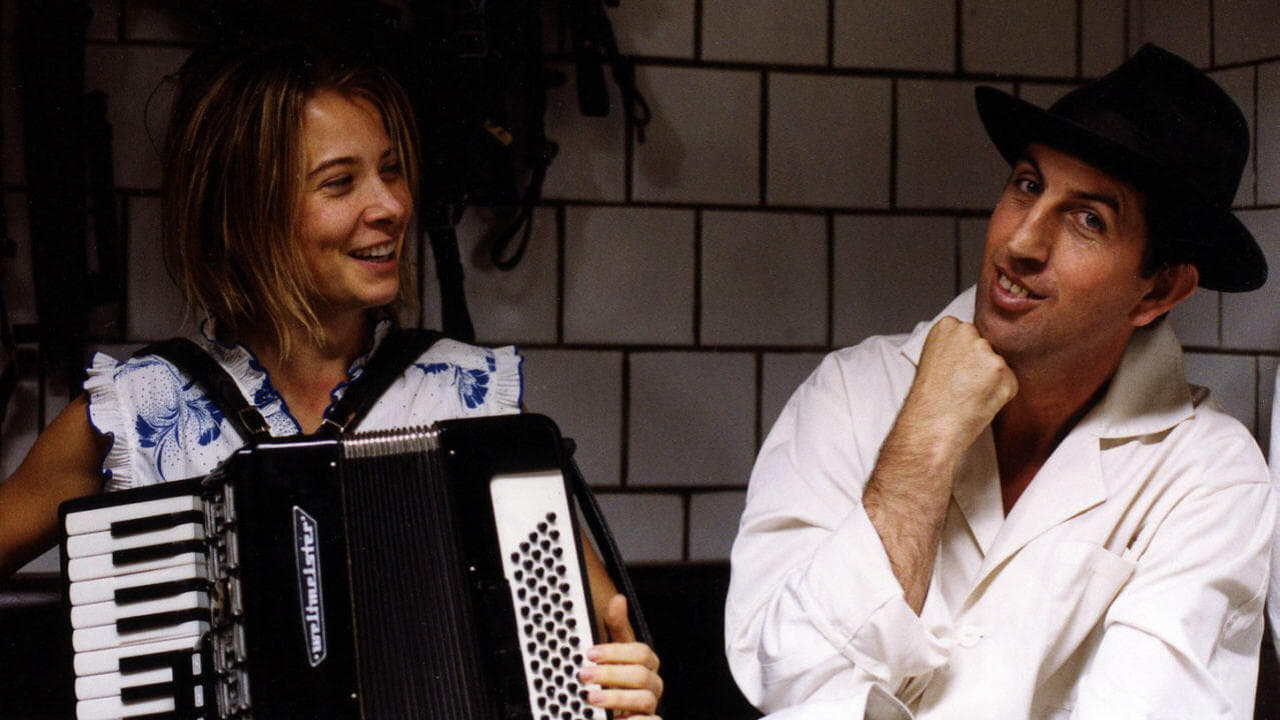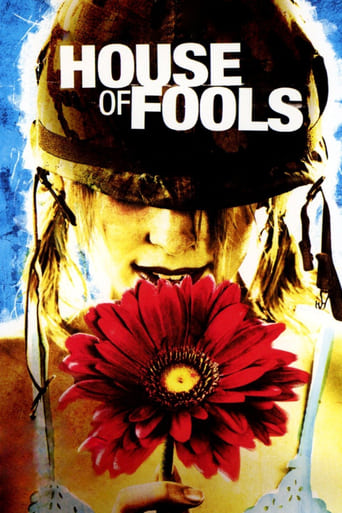

Although this was a French-Russian conglomeration, it was blatantly more French than Russian. In fact, the only element Russian in this film was the stamp from the ministry. Central to the story was the life and dream of a young and pretty patient who can play the accordion and dreams of meeting her lover, Brian Adams. One can not criticise to much of how insane people are, as that is completely on another level of consciousness. However, the times where the dream sequences involved Brian Adams, the director must have been told to eat both cheese and sugar, leaving you not disgusted but certainly leaving confusion on the senses. All the other times how she coped of what disasters where happening around her, balanced the film out. The film was based on a true story and it did portray effectively a breakdown in relations between the ex-soviet states and imperialist Russia and its detrimental consequences of which were given, albeit in a light hearted fashion. The acting overall was very good and I was greatly amused, as well as touched of how the characters related to each other.To conclude, it really does give the impression that those that are insane can see more sense that those that are sane. God help us all.
... View MoreA hospital near a monorail.A merciless war.The soldiers' grimness.The psychiatrist left his "psihushka" to seek means of securing his patients.The clinic is taken over alternatively by Chechens and by Russians,and made over into a battle scene.The mad people:some are grovelling,others are grumpy,others grinning, contentious, fractious, petulant,forlorn, babyish,foul, fossils of disease.The Chechen soldiers are portly,while some of the young ones are very handsome.My favorite scene is the Chechens' song:heart-breaking and manly.It also offers a sample of the beauty and musical valences of that Oriental language.One of the best musical moments in cinema's history."Dom ..." is made of suavity and infinite tenderness.The story is limber.In depth,this flick about an amorous insane woman is a parable about the ambiguity of life.The score is a profusion of beauty and Oriental privacy.Mrs. Vysotskaya is amazing as "Jana";the rest of the cast is first-class.Visually,the movie is not as beautiful as many Russian movies are (e.g.,Utomlyonnye Solntsem).The photography is deliberately made to look like that of a documentary.The hospital is not grisly;"Dom Durakov" is not about madness in a clinical sense,nor war,nor love,for what love could be that;it is about the ambiguity of life,about the hidden infinite suavity.The hospital itself is a parable.It is a clinic of parable and symbol,not one of cruel naturalism.The aesthetics is one of insobriety,extravagance,fancy and powerful exuberance."Dom ..." features a pleasurable and plain cosmopolitanism:Adams and Chechen songs.Konchalovsky is back in high form,with this work of contemplation and insight.Tocilescu,the Romanian director,praised to the skies this film's richness.
... View MoreI love this movie. The third time I watched it, it made me laugh and it made me cry. I know that a lot of people are not going to like this movie. It's like a poem.... you get it or you don't. People complain about the Bryan Adams segments. I thought they were too few and not long enough. They were Zhanna's dreams.... her escape. And after you feel Janna's frustration, unhappiness, and pain you welcome the relief and warm colors of the Bryan Adams escape from reality. The movie has some very surreal scenes. One of them is the scene where Zhanna is looking at her wedding pictures in her room while the Chechen sniper is shooting out her window. Yuliya Vysotskaya is wonderful as Zhanna. Her face is so child-like and expressive. She doesn't even need to speak; I can read her mind in her face. She's a really great actor. I love the scene where she discovers Ahmed in front of her in the lunch line. She says nothing, but her face changes several times, showing some strong emotions that you cannot understand unless you've seen the entire movie up to that point. Zhanna has some funny little quirks, like the way she steps over every doorway threshold. But I thought it odd that I didn't laugh or cry until the third viewing. The first time, I was just in awe. I was just wide eyed with amazement.But by the third time I loved and understood the characters, especially Zhanna, and so I could feel the movie.
... View MoreOne Flew Over the Cuckoo's Nest is a great movie that was based on an even greater book, but I wish people wouldn't compare this movie to that one so often. Yes, the similarities are extensive and impossible to miss, but House of Fools, as the title translates into English, is a different film that has it's own weight and it's own meanings. This is not, by any means whatsoever, another vision of Ken Kesey's classic, nor is it a remake in any way of that of Milos Forman. (spoilers) Yuliya Vysotskaya, who played Janna, the main character, delivers a wonderful performance of this woman who lives in a mental hospital right on the Russian border during the Chechen War (a war about which I admittedly know absolutely nothing). Her ailment is never made clear (nor are any of the others), except for a scene in the middle of the movie where she reveals, through dialogue, some of what are probably many more illusions (I won't count her illusory belief that she can dance). As she is being abandoned by Ahmed, who she thinks is the love of her life, she tells him that she loves him, and asks him to please don't kill her. Then she tells the mud that she loves it, and please don't kill her, etc.Her mental condition is not important, although her character, while skillfully performed, is so laden with a cloying freight of symbolism that it often becomes difficult to see her as a person rather than a heavily symbolic character in a heavily symbolic movie. There is a common misconception (supported by the movie's very own tagline) that the doctors at the mental hospital around which the story revolved abandoned the patients, leaving them to fend for themselves during the Chechen War during which the movie takes place. I don't really understand this assertion, since the doctor returns at the end of the film, explains what happened to him when he went to find a bus to transfer the patients to a better hospital. Just the fact that he returned should have been enough to show that he didn't simply ditch them all.I wish I had a better memory for the names of the characters in the movie, because one of the other patients, the one with the wraparound glasses and the backpack full of his poetry, played a significant role in the movie. He and Janna are clearly the mother and father figures for the rest of the patients when they are left to their own devices, seeing over the rest of the cast and, periodically, offering the chance for audience members to question the validity of their respective mental instabilities. I don't know much about mental disorders, but there were certainly scenes in this movie where it seemed to me that they were being treated for more mental instability than they regularly displayed. These were balanced out, however, by scenes where they each displayed rather crippling disabilities, his the complete inability to communicate or assess situations effectively, and hers some dangerous attachment issues and the displacement of emotions onto things like inanimate objects. As far as the war goes, I won't go into detail about the meaning of the war itself in the film because, like I mentioned above, I know nothing about the war that is going on offscreen, but the movie makes some interesting points about the chaos and destructiveness of war. One of them is the almost-cliché of the man who saves another man's life, only to find himself fighting on the opposite side from him later on. Sort of a cliché by now, yes, but it adds to the movie's later concentration on the chaos and confusion surrounding war in general. There are several scenes in which the mental patients are understandably terrified and utterly lost as to what is going on around them. This is to be expected, but there are also several scenes in which the soldiers and even their commanders are pretty confused as to what is happening. One tense scene has two opposing factions facing each other (notably making an illicit drug deal), when one of the soldiers carelessly stumbles on his gun, making it fire off a few rounds into the air, which leads to the two groups firing machine guns at each other for several seconds before anyone realizes that it was all just a stupid mistake. The soldier who accidentally caused it laughs it off.The references to One Flew Over the Cuckoo's Nest are everywhere. The patients are left to their own devices (in this case because the doctor left longer than intended because he was delayed by the war, in the other case because McMurphy persuaded them all to escape for a while), which has a healing effect on all of them but not enough to make any of them want to leave the hospital, their home, at the end of the film. There's an interesting element of the movie involving Bryan Adams, who literally colors Janna's life with his music, even though she has a completely delusional relationship with him, which would seem to have a detrimental effect on her mental health. What I see by his occasional entrances into the movie are not some weak effort to provide recognizance by inserting an American pop star, but a layered effect of meaning that reflects the many other layers of meaning in the film. Bryan Adams, while he is not meant to have had a real relationship with this woman who thinks that she is engaged to him, lights up her life with his music (notice how the color fills the screen when it's playing), while she attempts to do the same for the rest of the patients with her own accordion playing. She doesn't always succeed with all of them, but she certainly does much more than she does with the soldiers, who she also plays for on more than one occasion, and is laughed at each time (which may very well signify some kind of juvenile cynicism among the lower ranks of military forces). I don't pretend to understand every level of symbolism that is portrayed in this movie, but it's important to notice that they're there. It's amazing how much more meaning and importance some little movie from Russia like this has than the typical multi-million dollar blockbuster released here in America, and I really wish that people would pay at least a tiny bit more attention to the few movies released (dare I say the majority of which come from other countries?) that actually mean something. There are a lot of things in this movie that are difficult to comprehend, indeed, many which seem to be in the movie as examples of pure artistic expression, but the movie as a whole, like it's main character, is so laden with meaning and symbolism that it is virtually impossible to see it all on just one viewing. The movie deserves at LEAST that much.
... View More